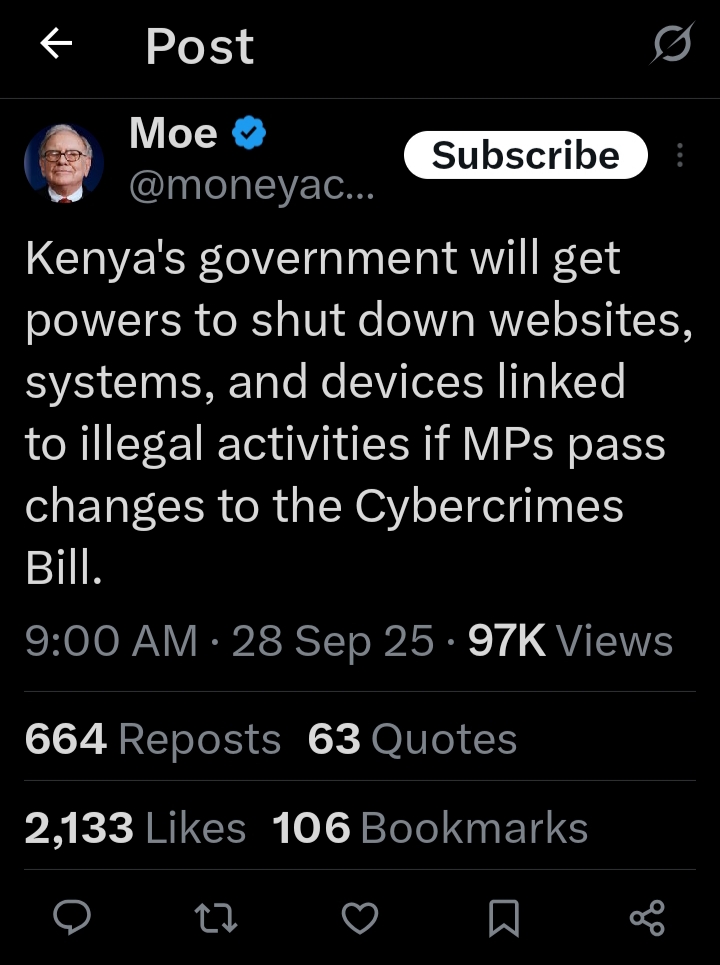Kenya is once again staring at a dangerous path where leaders sworn to protect freedoms are instead working overtime to restrict them.
The proposed Computer Misuse and Cybercrimes (Amendment) Bill, 2024, is being marketed as a tool to strengthen security, but behind the fine print lies a dangerous attempt to silence dissent and weaken constitutional freedoms.
MPs pushing for these amendments cannot pretend that they do not know what they are doing. Granting the government sweeping powers to shut down websites, deactivate devices, and block digital platforms under the vague excuse of “illegal activity” is nothing short of an attack on free speech.
The truth is, Kenya has been here before. In 2018, when the first cyber law was passed, courts struck down sections of it for being unconstitutional. Instead of learning from that ruling, lawmakers have chosen to double down, introducing even harsher measures that risk taking Kenya backward.
This bill is so broad that a simple social media post criticizing corruption or government policies could be flagged as illegal.
Once that happens, not only could a person’s account be blocked, but their entire device or app could be deactivated.
That is not security it is digital dictatorship dressed up as law.Kenyans have not stayed silent. Across platforms like X, citizens are voicing fears that these laws will be weaponized during elections to cut off communication, stop organization, and shield leaders from accountability.
The comparisons to countries where internet shutdowns sparked unrest are not far-fetched. The bill empowers state agencies like the National Cybercrime Coordination Centre to act with little oversight.

Without judicial checks, nothing stops the government from abusing this power to suppress voices it finds uncomfortable.
Digital rights advocates have already warned that this amounts to mass surveillance. It is telling that the same MPs who resist calls for transparency on corruption scandals are the ones so eager to control online spaces.
These are the same leaders who use social media to spread their own propaganda, but now want ordinary citizens gagged. The hypocrisy is glaring, and Kenyans can see through it.
Adding insult to injury, the bill proposes fines running into millions of shillings, which could crush small businesses and entrepreneurs. It even criminalizes vague offenses like content “offending religion,” a clause that can easily be twisted to target critics.
In a country where bloggers and activists already face harassment, these amendments would create an environment of fear, silencing voices before they even speak.
MPs cannot hide behind the excuse of fighting cybercrime. Real threats like hacking and online fraud can be addressed without destroying fundamental freedoms.
Kenya’s digital economy thrives on openness, innovation, and free expression. Crippling that space with oppressive laws will not protect the nation; it will weaken it.
By supporting this bill in its current form, MPs are betraying the Constitution and the citizens they represent.
Kenyans must remember that freedoms once lost are hard to regain. Lawmakers must be reminded that their mandate is not to muzzle the people but to protect them. If they insist on forcing this bill through without safeguards, the backlash will be on their hands.
The internet is not just a tool, it is a voice. And when MPs try to silence that voice, they are not strengthening Kenya, they are strangling it. This is not just legislation; it is an assault on democracy, and Kenyans cannot afford to stay silent.





















Add Comment